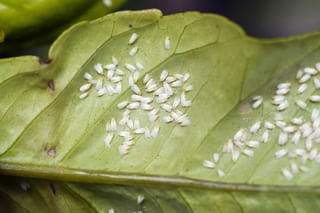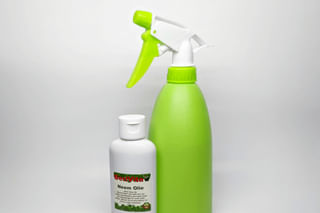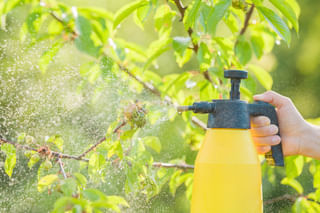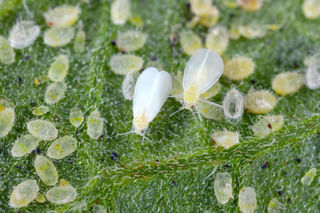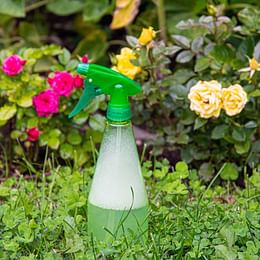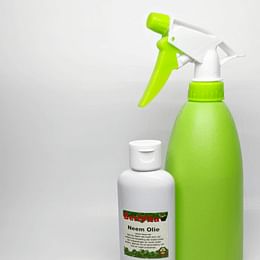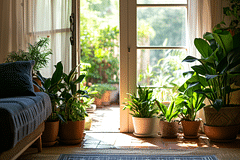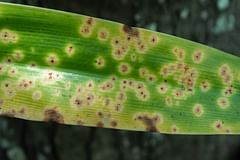How to Get Rid of Whiteflies on Houseplants
Get rid of whiteflies on your houseplants with this easy-to-follow guide, featuring step-by-step instructions and natural remedies for a healthy and thriving indoor garden. Learn how to identify, prevent and treat whiteflies without harmful chemicals, and enjoy your green oasis in no time. Perfect for beginner and experienced plant owners alike!
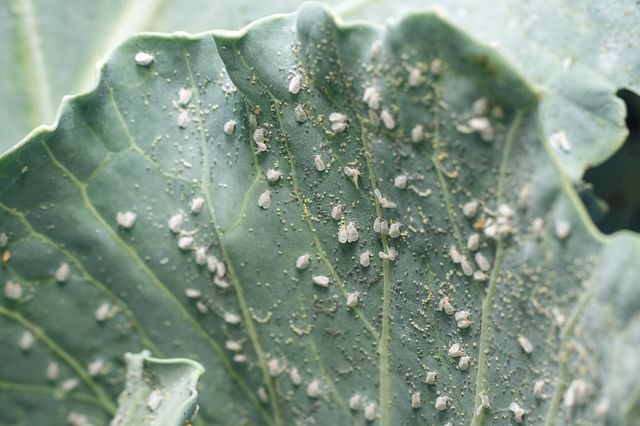
Are you dealing with flies around your houseplants? You might be dealing with whiteflies! Whiteflies are a tough and irritating problem for many houseplant owners. These tiny white insects feed on the sap of plants, causing yellowing leaves, wilting stems, and stunted growth.
In severe infestations, this pest can even cause plant death. If you've noticed signs of whitefly damage in your houseplants, it's time to take action! In this plant care guide, we'll look at how to identify and get rid of whiteflies on your houseplants.
These are the topics we're going to look at in this plant care guide:
Let's remove this pest from your plant and help it thrive again!
What are Whiteflies?
Before we can remove the pests, we'll need to identify if you're dealing with whiteflies or some other pest like Fungus Gnats.
Whiteflies are tiny, winged insects that are related to aphids and scale insects. They are about 1/16 inch long (around 2mm) and are usually found on the undersides of leaves. Whiteflies feed on the sap of plants, which can cause them to become weakened and stunted.
Whiteflies also produce a sticky substance called honeydew, which can attract other insects and lead to the growth of black mold. Ants are particularly attracted to this honeydew, so if you see ants around, be sure to check the undersides of your plant's leaves.
Signs of Whitefly Infestation
Are you suspicious that whiteflies may be infesting your plants? Knowing the signs of an infestation can help you identify and take action to prevent further damage.
These are the signs that you might be dealing with a whitefly infestation:
- Small, white insects flying around the plant
- Yellowing or discolored leaves
- Sticky residue on leaves or the ground around the plant
- Stunted growth of the plant
It's important to catch a whitefly infestation early, as they can quickly spread to other plants. Your very first step, after finding out you have whiteflies, is to isolate the plant, so the pests can't spread to the rest of your plants.
When you're ready to get rid of the whitefly infestation, it's best to start with a natural remedy, as this causes the least amount of damage to your plants. Let's see what our options are!
Natural Remedies for Whiteflies
One of the easiest ways to get rid of whiteflies on houseplants is to use natural remedies. Natural remedies are a great solution to get rid of whiteflies in houseplants!
Not only are they effective, but these treatments are also safe for plants and the environment. Many natural remedies can help you manage whiteflies in your home.
1. Yellow Sticky Traps
One effective solution is to strategically place yellow sticky traps around the areas you are attempting to protect: the color yellow attracts them! These traps are coated with a glue-like material that carefully catches the flies when they try to land.
It's important to remember to check and change the traps regularly. Not only does this help ensure the traps remain active, but it also helps you monitor how much your plants are being attacked.
2. Neem Oil
Neem oil is a natural insecticide harvested from the neem tree: the perfect pesticide for both your plant and our planet! This insect repellent helps keep whiteflies away without harming the environment.
Neem oil is easy to use: just mix it with water according to the instructions on the label, then spray it generously onto your affected plants. In this way, you're sure to be saying bye-bye to those flies!
3. Garlic Spray
Another great natural way to repel whiteflies is to use garlic. Its sulfur compounds quickly and effectively drive away these insects! You can easily mix your garlic spray.
Start by crushing several cloves and soaking them in water for a few days. When the mixture is ready, strain the garlic out and spray your plant with it. All you need is just a few simple ingredients and soon your home garden will be safe from whiteflies!
4. Soap Spray
If you're looking for a very cost-effective method of getting rid of whiteflies, you can use a regular soap spray. Simply mix a few drops of dish soap with water in an empty spray bottle.
Spray the affected areas with a thick coat of soapy water and give it some time to start suffocating those flies. This can take a few hours, so you can take care of the rest of your plants while you wait. After a few hours, rinse the plant once more to make sure any soap residue gets removed, and they will be pest free once again.
Chemical Remedies for Whiteflies
If natural remedies don't work, you can always choose to use chemical remedies. Chemical insecticides can be harmful to the plant, the environment, and even to humans and pets, so before you use them, make sure to read the label carefully to use the product as effectively and safely as possible.
1. Pyrethrin
Pyrethrin is a natural insecticide derived from chrysanthemum flowers, making it the perfect choice for a safe pesticide. It's effective against many pests without causing any harm to your houseplants! Pyrethrin can be sprayed directly onto plants with no worries.
Just use caution if you have any bees or other beneficial insects in the area, because they can be sensitive to this powerful solution. But as long as you handle it properly and show some care, this natural resource will be your best friend when faced with bugs!
2. Insecticidal Soap
Insecticidal soap is an innovative type of soap for managing whiteflies. Not only is it safe for plants, but it's super effective! It works by critically harming the insects by suffocating them when sprayed directly onto the plant as a slimy shield.
This powerful defense can be conveniently applied to help protect your houseplants against pests like the whitefly.
Preventing Whiteflies
Whitefly infestations can be quite tough to deal with, but did you know that it's much easier to prevent them from happening in the first place? If you're looking for simple, actionable ways to keep your houseplants safe then look no further! Here are some proactive tips to help you prevent whiteflies from popping up in the first place.
- Keep your plants healthy by watering them regularly and providing them with enough sunlight
- Inspect new plants carefully before bringing them into your home
- Remove any dead or diseased leaves from your plants
- Clean the leaves of your plants regularly to remove dust and debris
- Quarantine any plants that are infested with whiteflies to prevent them from spreading to other plants
With these simple, preventive steps, it should be much less likely that a whitefly infestation will happen to your plant collection. Preventing the infestation is always better than getting rid of one.
Thank you for reading this post! I hope it helps you to keep your plants healthy and beautiful! If you're looking for more guides on specific plants, you can always request a plant guide to get a guide for the plant you have trouble with.
Test your plant care knowledge
Quiz completed!
Want to learn more? Sign up for my newsletter to receive free tips in your inbox!
Sign up now!